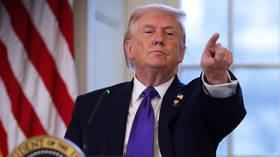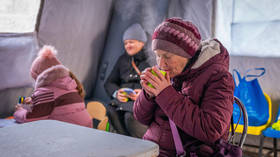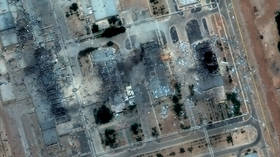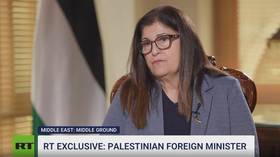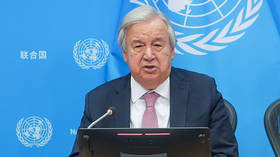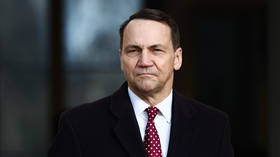Georgia recalls ambassador to Russia
Georgia is withdrawing its ambassador from Moscow after Russia confirmed it had ordered military flights over South Ossetia. Tbilisi says the diplomat is being recalled following an 'act of aggression'. The Russian military says the fighter jets stopped a
Georgia's Foreign Minister, Eka Tkeshelashvili, announced the decision to pull the ambassador out on Thursday, accusing Russia of sabre rattling. She said Erosi Kitsmarishvili was recalled for consultations in Tbilisi.
“Russia has revealed its attitude and political position not only in respect of international law, but also to issues of international security and stability in general,” Tkeshlashvili told journalists. She added: “We will undertake active and decisive steps, and today we will recall the Georgian ambassador to Russia for consultations”.
The news that Georgia is recalling its ambassador came after the Russian Foreign Ministry acknowledged that the country's military planes performed a reconnaissance mission over South Ossetia on Wednesday.
Defence officials claim the sortie was necessary to prevent the invasion of Georgian troops to Tskhinvali. Peacekeepers from Russia, Georgia, North and South Ossetia are monitoring the situation in the region in accordance with agreements.
South Ossetia remains a part of Georgia officially, but Tbilisi has no control over the breakaway republic.
Mighty ally’s support
Georgia ordered the withdrawal of its ambassador hours after U.S. Secretary of State Condoleezza Rice left the country after an official visit. She says the trip was meant to show support for Tbilisi. In recent years, Georgia and the United States have become allies.
“I want to, again, affirm that the United States remains committed to the territorial integrity of Georgia, to its democratic development,” Rice said.
“It is extremely important that the conflicts in Abkhazia and South Ossetia be resolved on the basis of principles that respect that territorial integrity, that respect the need for them to be resolved peacefully,” she said.
Georgian President Mikhail Saakashvili said he welcomed backing from the U.S.
“We are also very grateful for your support for our peace plan for the conflicts. And your unwavering support for Georgia's territorial integrity and peaceful resolution of the existing conflicts. Certainly without that support things might have been much more complicated, even more than they are, although they still are complicated.”
Blasts hit breakaway republics
The visit comes amid a backdrop of violent incidents in the country's breakaway republics. Blasts in the Abkhazian towns of Gagra, Sukhumi and Gali killed four and injured more than a dozen.
Abkhazia accused Tbilisi of organising the attacks, which Tblisi denied, and closed the border with Georgia.
Meanwhile, South Ossetia said it had been attacked by Georgian troops. At least one person was killed and, three others injured.
International observers confirmed that Georgia used rocket-propelled grenades in an attack on the capital Tskhinvali.
Georgia's plan, supported by the U.S. State Department, is to stop criminal attacks in the breakaway regions through an international peacekeeping force. However, both Abkhazian and South Ossetia are opposed to the idea.
Abkhazia and South Ossetia open for talks with Georgia
Abkhazian leader Sergey Bagapsh says a map, acquired through military intelligence, outlines Georgia's military operation against his republic. An attack, supposedly scheduled for April this year, never took place, he said.
Russia sent additional peacekeepers to the region in line with an existing peace agreement. Georgia has reacted angrily to the deployment, accusing Moscow of trying to annex the breakaway republics by stealth. Georgia has repeatedly called on Russia to withdraw the additional troops.
The de-facto authorities in Abkhazian and South Ossetian complain that they are not being listened to either in Tbilisi or in Washington.
South Ossetia's President Eduard Kokoyti says Thursday's recommendations on how to settle the conflicts are all one sided.
“They are not taking into consideration Abkhazian and South Ossetian opinions and can only worsen the situation in these regions. Russian peacekeepers are fulfilling their duties perfectly,”
Abkhazia says it's ready to resume talks with Georgia, but President Sergey Bagapsh says his republic will never agree to replace the Russian peacekeepers there with other forces.
According to him, Abkhazia will do everything possible for Russian peacekeepers to stay in the region and continue performing their mission.
“Today both Europe and the U.S. are trying to push the Russian peacekeepers out of the region. But I think – and this is the position of Abkhazians and South Ossetians – that peacekeepers are the only factor deterring violence in our regions,” Bagapsh said.
Russian forces began peacekeeping operations in Abkhazia and South Ossetia in the wake of the post-Soviet conflicts between Georgia and the breakaway republics in the early 90's. Tbilisi insists the territories still belong to Georgia. Both Abkhazia and South Ossetia have declared independence from Georgia, although neither region has been recognised internationally.
Russia calls for UN resolution
Recent tensions in Abkhazia were discussed at Thursday’s meeting between Russian Foreign Minister Sergey Lavrov and the Abkhazian President.
Russia is calling for the United Nations Security Council to pass a resolution on the issue.
“Yesterday we introduced a draft resolution to the UN Security Council which says that the main goal now is to prevent conflict,” Lavrov said.
“To do that an agreement on non-use of force should be signed immediately. Such an agreement was long ago accepted by Abkhazia, while the Georgian side continues to set conditions,” he said.
Despite peace plans proposed by Germany, America and others, the situation in Abkhazia and South Ossetia remains tense.
Many people in the regions live in fear that their homes may be bombarded by Georgian mortars. They say they are still open for negotiations, but that Georgia needs to make the first move.
Experts' opinions
Jonathan Kulick of the Georgian Foundation for Strategic and International Studies says the recalling of an ambassador is a common form of protest in international relations. He said the latest Georgian move doesn’t mean that war in the troubled region is now inevitable. Watch VIDEO.
Political analyst Irina Kobrinskaya from the Institute of World Economy and Foreign Affairs says Georgia’s latest move is connected to Condoleezza Rice’s visit to Tbilisi. “All sides want to demonstrate how far they are ready to go in this conflict, though the recalling of an ambassador is not an end. Moscow is waiting, if not for a compromise, a reason for a solution and the same goes for Georgia”, she said. Watch VIDEO.
However, political analyst Dmitry Suslov says the recall of the ambassador is unlikely to change either Moscow or Tbilisi’s policy on the breakaway republics. Watch VIDEO.
Meanwhile, Georgia has protested to Moscow about the flight of Russian fighter jets over South Ossetia on Wednesday. An official note of protest was sent to the adviser to the Russian ambassador in Tbilisi over the incident.
Tensions in the breakaway republics have increased in the past few weeks. The South Ossetian capital has come under mortar fire, while there have been several deadly explosions in Abkhazian resorts. Last Sunday four people were killed and six injured in a blast at a cafeteria in the town of Gali, close to the internal border with Georgia. Those killed included a United Nations translator.
On Wednesday Russia accused Georgia of stirring up conflict the the republics. Georgia in return blamed Russia of jeopardising the peace process in the region.


